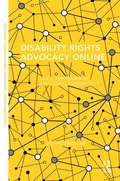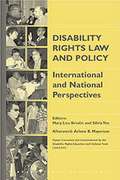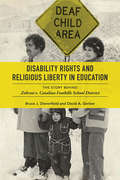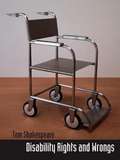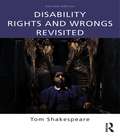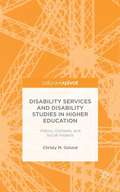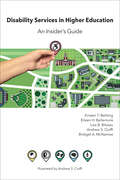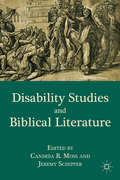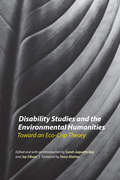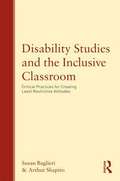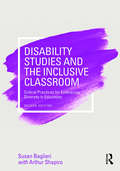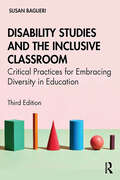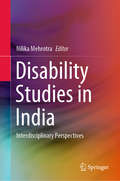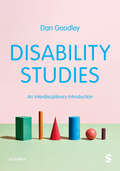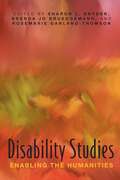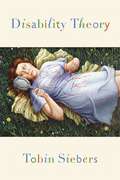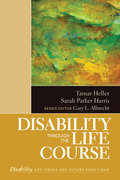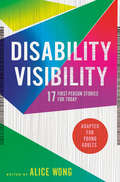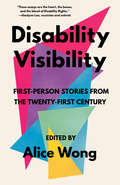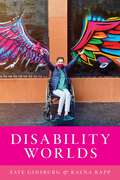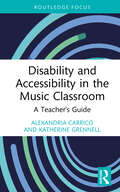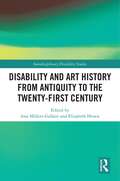- Table View
- List View
Disability Rights Advocacy Online: Voice, Empowerment and Global Connectivity (Routledge Studies in Global Information, Politics and Society)
by Filippo TrevisanDisability rights advocates in the United Kingdom and the United States recently embraced new media technologies in unexpected and innovative ways. This book sheds light on this process of renewal and asks whether the digitalisation of disability rights advocacy can help re-configure political participation into a more inclusive experience for disabled Internet users, enhancing their stakes in democratic citizenship.
Disability Rights Law and Policy: International and National Perspectives
by Mary Lou Breslin Silvia YeeThis volume describes the extraordinary success of the international political movement of people with disabilities to include disability as a human rights issue. The authors are renowned disability rights attorneys, university professors, and activists who practice, teach and work internationally.
Disability Rights and Religious Liberty in Education: The Story behind Zobrest v. Catalina Foothills School District (Disability Histories #12)
by David A. Gerber Bruce J. DierenfieldIn 1988, Sandi and Larry Zobrest sued a suburban Tucson, Arizona, school district that had denied their hearing-impaired son a taxpayer-funded interpreter in his Roman Catholic high school. The Catalina Foothills School District argued that providing a public resource for a private, religious school created an unlawful crossover between church and state. The Zobrests, however, claimed that the district had infringed on both their First Amendment right to freedom of religion and the Individuals with Disabilities Education Act (IDEA). Bruce J. Dierenfield and David A. Gerber use the Zobrests' story to examine the complex history and jurisprudence of disability accommodation and educational mainstreaming. They look at the family's effort to acquire educational resources for their son starting in early childhood and the choices the Zobrests made to prepare him for life in the hearing world rather than the deaf community. Dierenfield and Gerber also analyze the thorny church-state issues and legal controversies that informed the case, its journey to the U.S. Supreme Court, and the impact of the high court's ruling on the course of disability accommodation and religious liberty.
Disability Rights and Religious Liberty in Education: The Story behind Zobrest v. Catalina Foothills School District (Disability Histories)
by David A. Gerber Bruce J. DierenfieldIn 1988, Sandi and Larry Zobrest sued a suburban Tucson, Arizona, school district that had denied their hearing-impaired son a taxpayer-funded interpreter in his Roman Catholic high school. The Catalina Foothills School District argued that providing a public resource for a private, religious school created an unlawful crossover between church and state. The Zobrests, however, claimed that the district had infringed on both their First Amendment right to freedom of religion and the Individuals with Disabilities Education Act (IDEA). Bruce J. Dierenfield and David A. Gerber use the Zobrests' story to examine the complex history and jurisprudence of disability accommodation and educational mainstreaming. They look at the family's effort to acquire educational resources for their son starting in early childhood and the choices the Zobrests made to prepare him for life in the hearing world rather than the deaf community. Dierenfield and Gerber also analyze the thorny church-state issues and legal controversies that informed the case, its journey to the U.S. Supreme Court, and the impact of the high court's ruling on the course of disability accommodation and religious liberty.
Disability Rights and Wrongs
by Tom ShakespeareOver the last thirty years, the field of disability studies has emerged from the political activism of disabled people. In this challenging review of the field, leading disability academic and activist Tom Shakespeare argues that the social model theory has reached a dead end. Drawing on a critical realist perspective, Shakespeare promotes a pluralist, engaged and nuanced approach to disability. Key topics discussed include: dichotomies - the dangerous polarizations of medical model versus social model, impairment versus disability and disabled people versus non-disabled people identity - the drawbacks of the disability movement's emphasis on identity politics bioethics in disability - choices at the beginning and end of life and in the field of genetic and stem cell therapies care and social relationships - questions of intimacy and friendship. This stimulating and accessible book challenges orthodoxies in British disability studies, promoting a new conceptualization of disability and fresh research agenda. It is an invaluable resource for researchers and students in disability studies and sociology, as well as professionals, policy makers and activists.
Disability Rights and Wrongs
by Tom ShakespeareBringing together Tom Shakespeare's innovative work from over the past ten years, 'Disability Rights and Wrongs' presents an analysis of the key issues in disability studies. The text examines issues such as biological and social factors, the challenge to medicine and genetics, rhetoric and empowerment.
Disability Rights and Wrongs Revisited
by Tom ShakespeareOver the last forty years, the field of disability studies has emerged from the political activism of disabled people. In this challenging review of the field, leading disability academic and activist Tom Shakespeare argues that disability research needs a firmer conceptual and empirical footing. This new edition is updated throughout, reflecting Shakespeare’s most recent thinking, drawing on current research, and responding to controversies surrounding the first edition and the World Report on Disability, as well as incorporating new chapters on cultural disability studies, personal assistance, sexuality, and violence. Using a critical realist approach, Disability Rights and Wrongs Revisited promotes a pluralist, engaged and nuanced approach to disability. Key topics discussed include: dichotomies – going beyond dangerous polarizations such as medical model versus social model to achieve a complex, multi-factorial account of disability identity - the drawbacks of the disability movement's emphasis on identity politics bioethics - choices at the beginning and end of life and in the field of genetic and stem cell therapies relationships – feminist and virtue ethics approaches to questions of intimacy, assistance and friendship. This stimulating and accessible book challenges disability studies orthodoxy, promoting a new conceptualization of disability and fresh research agenda. It is an invaluable resource for researchers and students in disability studies and sociology, as well as professionals, policy makers and activists.
Disability Services and Disability Studies in Higher Education: History, Contexts, and Social Impacts
by Christy M. OslundChristy Oslund explores how the divide between disability studies and disability services, which exist on college and university campuses everywhere, impacts students with disability on campus.
Disability Services in Higher Education: An Insider's Guide
by Kirsten T. Behling, Eileen H. Bellemore, Lisa B. Bibeau, Andrew S. Cioffi, and Bridget A. McNameeDisability Services in Higher Education is the first comprehensive guide for people working in the field of ADA compliance in higher education. The authors examine how disabilities are supported to ensure students receive appropriate accommodations throughout their collegiate experience as well as provide guidance on overall campus accessibility. This volume provides an overview of the responsibilities of a Disabilities Service professional through an examination of relevant literature, laws and regulatory language, case law, and narrative on established practices. It also offers resources that current professionals can modify for use in their day-to-day practice immediately. The authors explore the complexities of accessibility, paying careful attention to the nuances of disability evaluation, accommodation decisions, management of a disability service office, advocating for resources and collaboration within and outside of higher education institutions. This practitioner-friendly book will help newcomers and seasoned professionals explore and evaluate best practices in the field through questions, examples, and functional job aids available for immediate use.
Disability Studies and Biblical Literature
by Jeremy Schipper Candida R. MossThe primary aim of this volume is to synthesize the two fields of disability studies and biblical studies. It illustrates how academic or critical biblical scholarship has shown that many texts involving disability in the Bible is much more nuanced than a casual reading or isolated proof texting may indicate.
Disability Studies and the Environmental Humanities: Toward an Eco-Crip Theory
by Stacy Alaimo Sarah Jaquette Ray Jay SibaraAlthough scholars in the environmental humanities have been exploring the dichotomy between “wild” and “built” environments for several years, few have focused on the field of disability studies, a discipline that enlists the contingency between environments and bodies as a foundation of its scholarship. On the other hand, scholars in disability studies have demonstrated the ways in which the built environment privileges some bodies and minds over others, yet they have rarely examined the ways in which toxic environments engender chronic illness and disability or how environmental illnesses disrupt dominant paradigms for scrutinizing “disability.” Designed as a reader for undergraduate and graduate courses, Disability Studies and the Environmental Humanities employs interdisciplinary perspectives to examine such issues as slow violence, imperialism, race, toxicity, eco-sickness, the body in environmental justice, ableism, and other topics. With a historical scope spanning the seventeenth century to the present, this collection not only presents the foundational documents informing this intersection of fields but also showcases the most current work, making it an indispensable reference.
Disability Studies and the Inclusive Classroom: Critical Practices for Creating Least Restrictive Attitudes
by Susan BaglieriThis book's mission is to integrate knowledge and practice from the fields of disability studies and special education. Parts I & II focus on the broad, foundational topics that comprise disability studies (culture, language, and history) and Parts III & IV move into practical topics (curriculum, co-teaching, collaboration, classroom organization, disability-specific teaching strategies, etc.) associated with inclusive education. This organization conforms to the belief that least restrictive environments (the goal of inclusive education) necessarily emerges from least restrictive attitudes (the goal of disability studies). Discussions throughout the book attempt to illustrate the intersection of theory and practice.
Disability Studies and the Inclusive Classroom: Critical Practices for Embracing Diversity in Education
by Susan BaglieriDisability Studies and the Inclusive Classroom is a core textbook that integrates knowledge and practice from the fields of disability studies and special education. The second edition has been fully revised and updated throughout to include stronger connections between race, class, sexual orientation, gender, and disability to emphasize intersecting identities and experiences; stronger emphasis on curriculum and teaching rather than on attitudes toward disability; and updates to current events, cultural references, resources, research literature, laws, and policies.
Disability Studies and the Inclusive Classroom: Critical Practices for Embracing Diversity in Education
by Susan BaglieriDisability Studies and the Inclusive Classroom integrates knowledge and practice from the fields of disability studies and special education to provide readers with a comprehensive understanding of inclusive education. Now in its third edition, this critical volume has been revised and updated to include expanded discussion of disability models and contemporary perspectives on disability. Each chapter features a dilemma to capture the complexities of the field of educational practice to inspire critical thinking and contemplation of inclusive education.
Disability Studies in India: Interdisciplinary Perspectives
by Nilika MehrotraThis book examines the state of art in disability studies, focusing on the Indian context, as well as the broader South Asian situation. It presents interdisciplinary perspectives on the basic idea, evolution, practices and challenges of researching and teaching disability studies at various higher education institutions and in other civil society spaces. The chapters address a range of related themes, including activism, development policies, research, pedagogy, spatial and social access, caste and gender representations and rights-based discourses. Given the scope of its coverage, the book is of interest to scholars and students in area of humanities, education, law, sociology and social work, political science development and disability studies.
Disability Studies: An Interdisciplinary Introduction
by Dan GoodleyWhat if disability isn′t a problem but a resource? This updated edition of a classic text in the field of disability studies interrogates the commonly held view that disability is something that needs to be ′cured′ or ′eradicated′. It shows us how disability can challenge our thinking and help us to imagine a more socially just society, offering an engaging introduction to a diverse and globally expanding subject. Taking an interdisciplinary approach, this text will be of interest to undergraduates, graduates, and researchers across the social sciences. Making the case that disability is much more than just impairment, this book uncovers the ways in which disabled people are challenging discrimination and marginalisation. Ranging across topics such as health, activism and education, this book asks questions about the ways in which society tends to understand disability and offers alternative explanations that are more exciting, radical and transformative.
Disability Studies: An Interdisciplinary Introduction
by Dan GoodleyWhat if disability isn′t a problem but a resource? This updated edition of a classic text in the field of disability studies interrogates the commonly held view that disability is something that needs to be ′cured′ or ′eradicated′. It shows us how disability can challenge our thinking and help us to imagine a more socially just society, offering an engaging introduction to a diverse and globally expanding subject. Taking an interdisciplinary approach, this text will be of interest to undergraduates, graduates, and researchers across the social sciences. Making the case that disability is much more than just impairment, this book uncovers the ways in which disabled people are challenging discrimination and marginalisation. Ranging across topics such as health, activism and education, this book asks questions about the ways in which society tends to understand disability and offers alternative explanations that are more exciting, radical and transformative.
Disability Studies: Enabling the Humanities
by Brenda Jo Brueggemann Sharon L. Snyder Rosemarie Garland-ThomsonImages of disability pervade language and literature, yet disability is, as the volume's introduction notes, "the ubiquitous unspoken topic in contemporary culture." The twenty-five essays in Disability Studies provide perspectives on disabled people and on disability in the humanities, art, the media, medicine, psychology, the academy, and society.Edited and introduced by Sharon L. Snyder, Brenda Jo Brueggemann, and Rosemarie Garland-Thomson and containing an afterword by Michael Bérubé (author of Life As We Know It), the volume is rich in its cast of characters (including John Bulwer, Teresa de Cartagena, Audre Lorde, Oliver Sacks, Samuel Johnson, Mark Twain, Walt Whitman); in its powerful, authentic accounts of disabled conditions (deafness, blindness, MS, cancer, the absence of limbs); in its different settings (ancient Greece, medieval Spain, Nazi Germany, the modern United States); and in its mix of the intellectual and the emotional, of subtle theory and plainspoken autobiography.
Disability Theory
by Tobin Siebers"Disability Theory is just the book we've been waiting for. Clear, cogent, compelling analyses of the tension between the 'social model' of disability and the material details of impairment; of identity politics and unstable identities; of capability rights and human interdependence; of disability and law, disability as masquerade, disability and sexuality, disability and democracy---they're all here, in beautifully crafted and intellectually startling essays. Disability Theory is a field-defining book: and if you're curious about what 'disability' has to do with 'theory,' it's just the book you've been waiting for, too." ---Michael Bérubé, Pennsylvania State University. "Disability Theory is magisterially written, thoroughly researched, and polemically powerful. It will be controversial in a number of areas and will probably ruffle feathers both in disability studies as well as in realms of cultural theory. And that's all to the good." ---Michael Davidson, University of California, San Diego. "Not only is Disability Theory a groundbreaking contribution to disability studies, it is also a bold, ambitious and much needed revision to a number of adjacent and overlapping fields including cultural studies, literary theory, queer theory, and critical race studies. Siebers has written a powerful manifesto that calls theory to account and forces readers to think beyond our comfort zones." ---Helen Deutsch, University of California, Los Angeles. Intelligent, provocative, and challenging,Disability Theory revolutionizes the terrain of theory by providing indisputable evidence of the value and utility that a disability studies perspective can bring to key critical and cultural questions. Tobin Siebers persuasively argues that disability studies transfigures basic assumptions about identity, ideology, language, politics, social oppression, and the body. At the same time, he advances the emerging field of disability studies by putting its core issues into contact with signal thinkers in cultural studies, literary theory, queer theory, gender studies, and critical race theory. Tobin Siebers is V. L. Parrington Collegiate Professor, Professor of English Language and Literature, and Professor of Art and Design at the University of Michigan.
Disability Through the Life Course
by Professor Tamar Heller Sarah K. Parker HarrisThis volume in The SAGE Reference Series on Disability explores issues involving disability through the life courses, and is one of eight volumes in the cross-disciplinary and issues-based series, which examines topics central to the lives of individuals with disabilities and their families. With a balance of history, theory, research, and application, specialists set out the findings and implications of research and practice for others whose current or future work involves the care and/or study of those with disabilities, as well as for the disabled themselves. The concise, engaging presentational style emphasizes accessibility. Taken individually, each volume sets out the fundamentals of the topic it addresses, accompanied by compiled data and statistics, recommended further readings, a guide to organizations and associations, and other annotated resources, thus providing the ideal introductory platform and gateway for further study. Taken together, the series represents both a survey of major disability issues and a guide to new directions and trends and contemporary resources in the field as a whole.
Disability Visibility (Adapted for Young Adults): 17 First-Person Stories for Today
by Edited by Alice WongDisabled young people will be proud to see themselves reflected in this hopeful, compelling, and insightful essay collection, adapted for young adults from the critically acclaimed adult book, Disability Visibility: First Person Stories from the Twenty-First Century that "sheds light on the experience of life as an individual with disabilities, as told by none other than authors with these life experiences." --Chicago Tribune, "Best books published in summer 2020" (Vintage/Knopf Doubleday edition).The seventeen eye-opening essays in Disability Visibility, all written by disabled people, offer keen insight into the complex and rich disability experience, examining life's ableism and inequality, its challenges and losses, and celebrating its wisdom, passion, and joy. The accounts in this collection ask readers to think about disabled people not as individuals who need to be &“fixed,&” but as members of a community with its own history, culture, and movements. They offer diverse perspectives that speak to past, present, and future generations. It is essential reading for all.
Disability Visibility: First-Person Stories from the Twenty-First Century
by Alice Wong&“Disability rights activist Alice Wong brings tough conversations to the forefront of society with this anthology. It sheds light on the experience of life as an individual with disabilities, as told by none other than authors with these life experiences. It's an eye-opening collection that readers will revisit time and time again.&” —Chicago TribuneOne in five people in the United States lives with a disability. Some disabilities are visible, others less apparent—but all are underrepresented in media and popular culture. Activist Alice Wong brings together this urgent, galvanizing collection of contemporary essays by disabled people, just in time for the thirtieth anniversary of the Americans with Disabilities Act,From Harriet McBryde Johnson&’s account of her debate with Peter Singer over her own personhood to original pieces by authors like Keah Brown and Haben Girma; from blog posts, manifestos, and eulogies to Congressional testimonies, and beyond: this anthology gives a glimpse into the rich complexity of the disabled experience, highlighting the passions, talents, and everyday lives of this community. It invites readers to question their own understandings. It celebrates and documents disability culture in the now. It looks to the future and the past with hope and love.
Disability Worlds
by Faye Ginsburg Rayna RappIn Disability Worlds, Faye Ginsburg and Rayna Rapp chronicle and theorize two decades of immersion in New York City’s wide-ranging disability worlds as parents, activists, anthropologists, and disability studies scholars. They situate their disabled children’s lives among the experiences of advocates, families, experts, activists, and artists in larger struggles for recognition and rights. Disability consciousness, they show, emerges in everyday politics, practices, and frictions. Chapters consider dilemmas of genetic testing and neuroscientific research, reimagining kinship and community, the challenges of “special education,” and the perils of transitioning from high school. They also highlight the vitality of neurodiversity activism, disability arts, politics, and public culture. Disability Worlds reflects the authors’ anthropological commitments to recognizing the significance of this fundamental form of human difference. Ginsburg and Rapp’s conversations with diverse New Yorkers reveal the bureaucratic constraints and paradoxes established in response to the disability rights movement, as well as the remarkable creativity of disabled people and their allies who are opening pathways into both disability justice and disability futures.
Disability and Accessibility in the Music Classroom: A Teacher's Guide (Modern Musicology and the College Classroom)
by Alexandria Carrico Katherine GrennellDisability and Accessibility in the Music Classroom provides college music history instructors with a concise guide on how to create an accessible and inclusive classroom environment. In addition to providing a concise overview of disability studies, highlighting definitions, theories, and national and international policies related to disability, this book offers practical applications for implementing accessibility measures in the music history classroom. The latter half of this text provides case studies of well-known disabled composers and musicians from the Western Art Music canon from the Middle Ages to the Twentieth Century as well as popular music genres, such as the blues, jazz, R&B, pop, country, and hip hop. These examples provide opportunities to integrate discussions of disability into a standard music history curriculum.
Disability and Art History from Antiquity to the Twenty-First Century (Interdisciplinary Disability Studies)
by Ann Millett-GallantThis volume analyzes representations of disability in art from antiquity to the twenty-first century, incorporating disability studies scholarship and art historical research and methodology. This book brings these two strands together to provide a comprehensive overview of the intersections between these two disciplines. Divided into four parts: Ancient History through the 17th Century: Gods, Dwarfs, and Warriors 17th-Century Spain to the American Civil War: Misfits, Wounded Bodies, and Medical Specimens Modernism, Metaphor and Corporeality Contemporary Art: Crips, Care, and Portraiture and comprised of 16 chapters focusing on Greek sculpture, ancient Chinese art, Early Italian Renaissance art, the Spanish Golden Age, nineteenth century art in France (Manet, Toulouse-Lautrec) and the US, and contemporary works, it contextualizes understandings of disability historically, as well as in terms of medicine, literature, and visual culture. This book is required reading for scholars and students of disability studies, art history, sociology, medical humanities and media arts.
